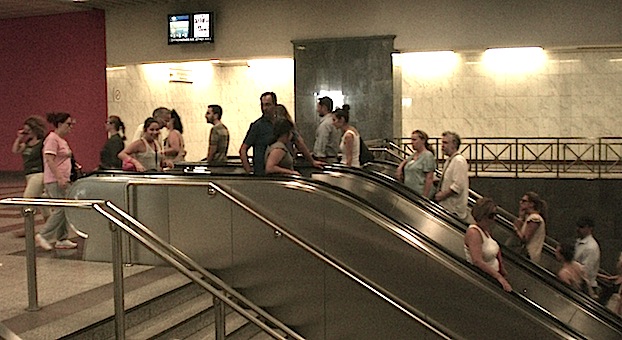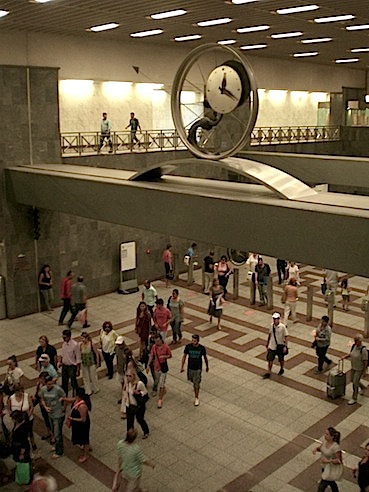Victoria Mindova
"Please mind your personal belongings" is the first thing you will hear when you get into the Athenian subway after the doors close. Thefts of wallets, cell phones and other small items are routine in the Athenian public transport. This week, guests and citizens of Athens should be even more careful, since the Athenian subway is without permanent security guards at the stations. The contract of the subcontractor company, which had undertaken the guarding of the stations, expires in early September. Disorders in the public tender for undertaking security services left passengers unprotected for an unknown period of time. GRReporter contacted the main information desk of the underground transport in Syntagma Square to ask when the subway stations will have security again. "When a new contract is signed with a subcontractor" was the laconic answer of the employee. Before I could ask her when this was expected to happen, she hastened to add: "We do not know when the procedures will be completed. We're all waiting. There is no determined deadline".
The main competitors to undertake the security services in the subway are the companies BRINKS and PYRSOS. Originally, the tender was won by PYRSOS, which had made a more competitive bid.  BRINKS in turn appealed against the decision, because the value of the wages, foreseen in the offer of PYRSOS, was lower than that established by the collective agreement for the sector. PYRSOS says that they have signed individual agreements with the employees, in order to be able to give a lower price and win the auction to guard the subway. However, the Supreme Administrative Court ruled in favour of BRINKS. According to the information, the supreme court had refused to recognize the memorandum changes in labour law (according to which companies have the right to sign individual employment contracts with their employees) and recognized only the older form of collective agreements. After the decision was issued, BRINKS had to undertake the obligations of guarding the stations, but STASY (the company which manages the underground, tram and electric rail transport) has not signed the contract with the guards yet. The reasons remain unknown, and until the matter is resolved, passengers in the underground transport will not be able to address anybody in case of an accident.
BRINKS in turn appealed against the decision, because the value of the wages, foreseen in the offer of PYRSOS, was lower than that established by the collective agreement for the sector. PYRSOS says that they have signed individual agreements with the employees, in order to be able to give a lower price and win the auction to guard the subway. However, the Supreme Administrative Court ruled in favour of BRINKS. According to the information, the supreme court had refused to recognize the memorandum changes in labour law (according to which companies have the right to sign individual employment contracts with their employees) and recognized only the older form of collective agreements. After the decision was issued, BRINKS had to undertake the obligations of guarding the stations, but STASY (the company which manages the underground, tram and electric rail transport) has not signed the contract with the guards yet. The reasons remain unknown, and until the matter is resolved, passengers in the underground transport will not be able to address anybody in case of an accident.
"The fact that there are no guards in the subway is very worrying" says a 26-year-old student from Athens. She uses the public transport every day and believes that private security in the subway is mandatory. "I have witnessed how drug addicts get on the train, and they may become aggressive if you do not give them some small change. In one such case, the guard at Victoria station of the electric train intervened and pulled the person out of the carriage. Now, if we find ourselves in a similar situation, who will help?".
Another important topic which concerns both the management of the Ministry of Development and Infrastructure, and the citizens, is the price of tickets. According to the financial plan of the government, the price must increase from the beginning of 2013 by 25% and become 1.75 euro from 1.40 euro now for the underground transport. For buses and trolleys, the price will rise to 1.50 euro from 1.20 euro now.
 On this matter the young girl says: "The Athenian subway is one of the newest and most modern in Europe. Its maintenance is important, and in comparison to the other European subways, the price for using the Athenian one is very low. 1.75 euro for the subway and for the electric train is not that much. The increase is reasonable." She compares the level of services in major European cities such as Berlin and London and estimates that the schedule of the subway there may be providing transport for shorter intervals, but the infrastructure is old, the stations aren't well maintained, nor are they clean, and the prices are two and even three times higher.
On this matter the young girl says: "The Athenian subway is one of the newest and most modern in Europe. Its maintenance is important, and in comparison to the other European subways, the price for using the Athenian one is very low. 1.75 euro for the subway and for the electric train is not that much. The increase is reasonable." She compares the level of services in major European cities such as Berlin and London and estimates that the schedule of the subway there may be providing transport for shorter intervals, but the infrastructure is old, the stations aren't well maintained, nor are they clean, and the prices are two and even three times higher.
However, not everybody shares this opinion. A pensioner, who uses the subway at least three times a week, believes that an increase in the price of tickets during a crisis, when all incomes, pensions and wages are decreasing, is not right. "If they really raise prices, I will limit my goings out. Unfortunately, my grandchildren live across the city and my children work long hours so they are not able to drive them home. The subway is convenient for me, but if the regular tickets' price increases, the price of the pensioners' tickets will rise as well", assumes the lady. A young man, who works part time in an Athenian tavern, says that the idea of increasing the price of the public transport tickets is absurd. "This shows once again that politicians in Greece do not want to deal with the problems in the budget and are looking for the easiest way to collect money from ordinary people", he says resentfully. The young man is adamant that if the price of tickets for subway transport increases he will not buy tickets and will travel gratis.